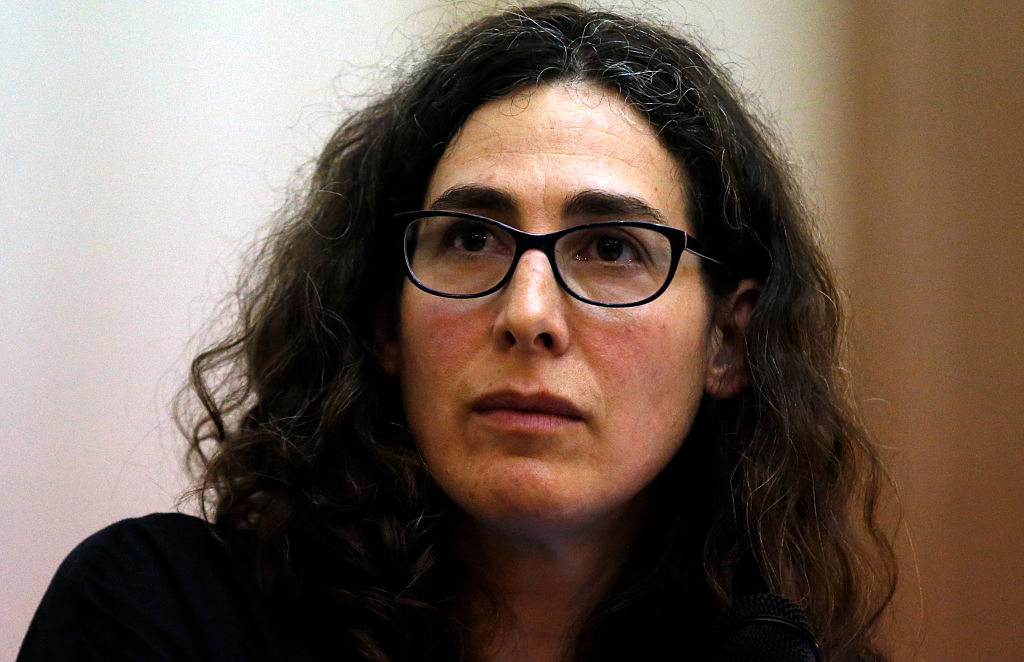Create a free profile to get unlimited access to exclusive videos, breaking news, sweepstakes, and more!
'Innocence Is A Misdemeanor,' New Season Of 'Serial' Shows How Minor Crimes Can Cause Major Problems
"In this county, innocence is a misdemeanor,” a defense attorney tells the show's narrator Sarah Koenig. Instead of focusing on one large-scale case, as 'Serial' did in previous seasons, this season promises to highlight injustice through investigating everyday cases.

“Serial’s” third season is very different than its predecessors. Instead of focusing on large-scale cases, it will be investigating the inner workings of a single courthouse. But make no mistake, these “small” court cases are a big deal for the defendants involved.
The season, which will be narrated by Sarah Koenig (pictured) and “This American Life” staffer Emmanuel Dzotsi, promises to cast a spotlight on the flaws of the justice system, just as it did in previous seasons, through highlighting common court cases at Cleveland’s Justice Center complex. The complex houses the city’s police department and its municipal and district courts.
Koenig opened up the show by explaining that the case of Adnan Syed, the subject of “Serial’s hit first season, is not “what fills America’s courtrooms every day.”
Instead, we learn about a very everyday court case: a bar fight and how it impacted a 21-year-old woman named “Anna” — not her real name. The episode is entitled “A Bar Fight Walks into the Justice Center.”
Warning: Spoilers below!
Surveillance footage shows Anna standing at the bar, as a man repeatedly gropes her. He slaps her behind seven times before Anna fights back, but not even physically yet. She just gets into his face. Another woman at the bar takes notice, but only of Anna’s aggression. Koenig notes she didn’t see the groping that led up to it.
It’s unclear which woman threw the first punch but a brawl breaks out. Koenig describes watching the footage and wincing when Anna gets stomped by the other woman. A police officer who was using the bar bathroom comes out during the fight and tries to break it up. In the heat of the moment, Anna punches him in the face. Koenig determines that Anna was swinging at everyone and everything as she was being defeated in the bar fight.
Of all the people in the bar that night, Anna was the only one detained. The woman who she was embroiled in the fight with fled after the officer showed up and the man who groped her was released by police after others in the bar vouched for him, claiming he would never do that to a woman.
So, Anna spends four days and is charged with a felony assault on a peace officer even though the officer she punched told her during her arrest he believed it was an accident and that he had no plans to file charges.
Anna’s defense attorney Russ Bensing tries unsuccessfully to get her charges dismissed. What’s the next best thing, according to him? A plea deal for a misdemeanor disorderly charge.
"In this county, innocence is a misdemeanor,” Bensing explains.
Anna has previous misdemeanor convictions, so, in Bensing’s way of thinking, what’s the big deal? Bensing says that if he tries to fight against the misdemeanor charge, he could be viewed as an “obstructionist” by his peers, someone who is “complicating things unnecessarily.”
“You don’t want to get a reputation for that,” Bensing says.
In fact, he calls Anna’s charge being downgraded to a misdemeanor an example of the system working despite admitting that his client shouldn’t have been charged in the first place.
Koenig doesn’t agree.
“This is what rankles me most about Anna’s case. The breeziness with which everyone [Bensing, the officer and prosecutors] is looking back on it now, clapping the dust off their hands and say that’s done. Small crime, small case, small punishment. All in proportion. Justice is served,” she says. “What they are not saying, maybe because they’re not seeing it, is the extent of Anna’s punishment [...] which was not small. It did not fit the crime.”
Koenig explains that Anna doesn’t live near the justice center. But, she had to make twenty trips to the center anyway, mostly for weekly drug tests seeing as she pleaded guilty. She also paid over $500 in court costs including reparation and a court special projects fund (fees that even Bensing couldn’t decipher) in addition to a $200 fine, plus a $500 to a bail bondsman to get out of jail. If she didn’t pay the $500 to get out of jail, Koenig says she could have been locked up for months.
Anna tells Koenig that it marked a rough year for her. Anna tears up talking about it and she blames herself, calling herself stupid for going to that bar in the first place.
Anna’s case isn’t extraordinary. In fact, it is representative for many defendants going through the legal system for minor offenses.
“Our criminal legal system routinely churns people through with little regard for their humanity. Every person we prosecute is a human being with value in our communities,” Ashley Hill, Deputy State's Attorney for Washington County, Vermont tells Oxygen.com after listening to the episode. “People charged with crimes have families and friends and are also our neighbors and, most importantly, fellow human beings.”
Koenig notes that a judge asked Bensing if Anna was related to a recently retired judge with the same last name and Bensing told Koenig that if she were, the charges would have been dismissed.
“Our current criminal legal system is unable to safely and successfully meet the needs of communities, victims, and offenders, and for years we have failed all interested parties in significant ways," Hill says. “Recognizing the trauma of the criminal legal process on every involved party is a relatively new concept.”
Hill added that victims are often revictimized by the criminal legal process. She said that often nothing is accomplished in criminal court even with a successful prosecution which offers them the support, services, or resolutions victims require or desire.
For Anna, justice was not served, Koenig feels.
Joseph Tully, a criminal lawyer from California agrees.
"This first episode of the new season reveals a basic truth that so many everyday citizens don’t know: what happened versus what is charged does not always meet up," he tells Oxygen.com. "It is not justice that is pursued, but conviction rates."
Koenig says that she notices a disturbing implication perminating the courthouse: “That we are not like them. The ones we arrest and punish, the ones with the stink. They are a slightly different species with senses dulled and toughened. They don’t feel pain or sorrow or joy or freedom or the loss of freedom the same way you or I would.”
She went on to state that this “little” case was not little for Anna.
“Anna didn’t feel the stress and outrage and shame of this case less than I would have,” Koenig admits. “I think she felt it more.”
[Photo: Getty Images]


























